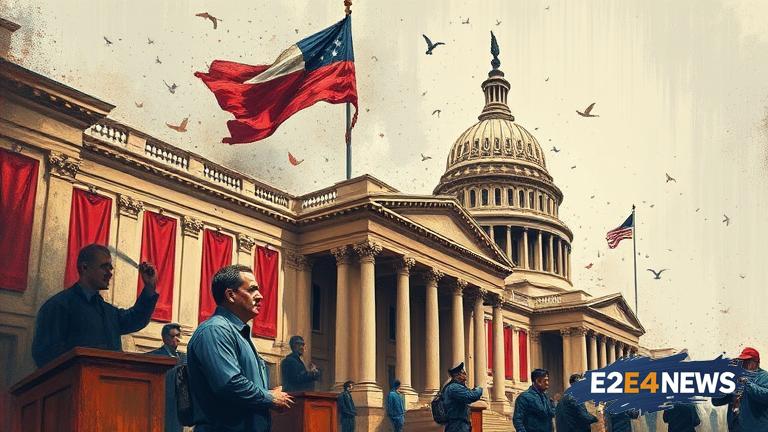The Texas Legislature is in a state of turmoil as House Democrats have fled the state to prevent a quorum, thereby stalling a vote on a contentious voting rights bill. The move has sparked a heated debate over election reform and voting rights, with Democrats arguing that the bill would disenfranchise minority voters. The special session, called by Governor Greg Abbott, aims to pass several key bills, including the voting rights bill, which Democrats claim would restrict access to the ballot box. In response to the Democrats’ move, Republican leaders have threatened to arrest the absent lawmakers, citing a provision in the Texas Constitution that allows for the arrest of members who are absent without leave. The situation has drawn national attention, with many seeing it as a battle over voting rights and democracy. The Democrats’ decision to break quorum has been met with praise from many civil rights groups, who argue that the voting rights bill would disproportionately affect minority voters. On the other hand, Republicans have accused the Democrats of abandoning their duties and preventing the Legislature from conducting its business. The voting rights bill, which is at the center of the controversy, would impose stricter voter ID requirements, limit early voting, and restrict mail-in voting. Democrats argue that these measures would make it more difficult for minority voters to cast their ballots, while Republicans claim that they are necessary to prevent voter fraud. The special session is set to last for 30 days, and it remains to be seen whether the Democrats will return to the state to allow the Legislature to conduct its business. In the meantime, the situation has sparked a heated debate over voting rights and election reform, with many seeing it as a battle over the future of democracy in Texas. The state has a long history of voter suppression, and many argue that the voting rights bill would only exacerbate the problem. The Democrats’ move has also drawn attention to the issue of gerrymandering, which has been a major factor in the state’s electoral politics. The Legislature’s redistricting efforts have been criticized for favoring Republican candidates, and many argue that the voting rights bill would only further entrench the party’s advantage. As the situation continues to unfold, it remains to be seen whether the Democrats will be able to prevent the passage of the voting rights bill. The party has vowed to continue fighting against the bill, which they see as a threat to democracy and voting rights. The special session has also highlighted the deep divisions within the Texas Legislature, with many lawmakers on both sides of the aisle expressing frustration and anger over the situation. The arrest threat has added an extra layer of tension to the situation, with many wondering whether the Republican leaders will follow through on their promise. The situation has also drawn attention to the role of the Texas Constitution, which grants the Legislature the power to compel the attendance of absent members. The Constitution also provides for the arrest of members who are absent without leave, which has been cited by Republican leaders as the basis for their threat. As the situation continues to unfold, it remains to be seen whether the Democrats will be able to prevent the passage of the voting rights bill and protect the voting rights of minority voters. The special session has highlighted the importance of voting rights and election reform, and many argue that the outcome will have significant implications for the future of democracy in Texas. The state’s electoral politics have long been marked by controversy and division, and the current situation is only the latest example of this. The Democrats’ move has sparked a national conversation about voting rights and election reform, with many seeing it as a battle over the future of democracy. The situation has also highlighted the importance of civic engagement and activism, with many arguing that the outcome will depend on the actions of ordinary citizens. As the special session continues, it remains to be seen whether the Democrats will be able to achieve their goals and protect the voting rights of minority voters.





